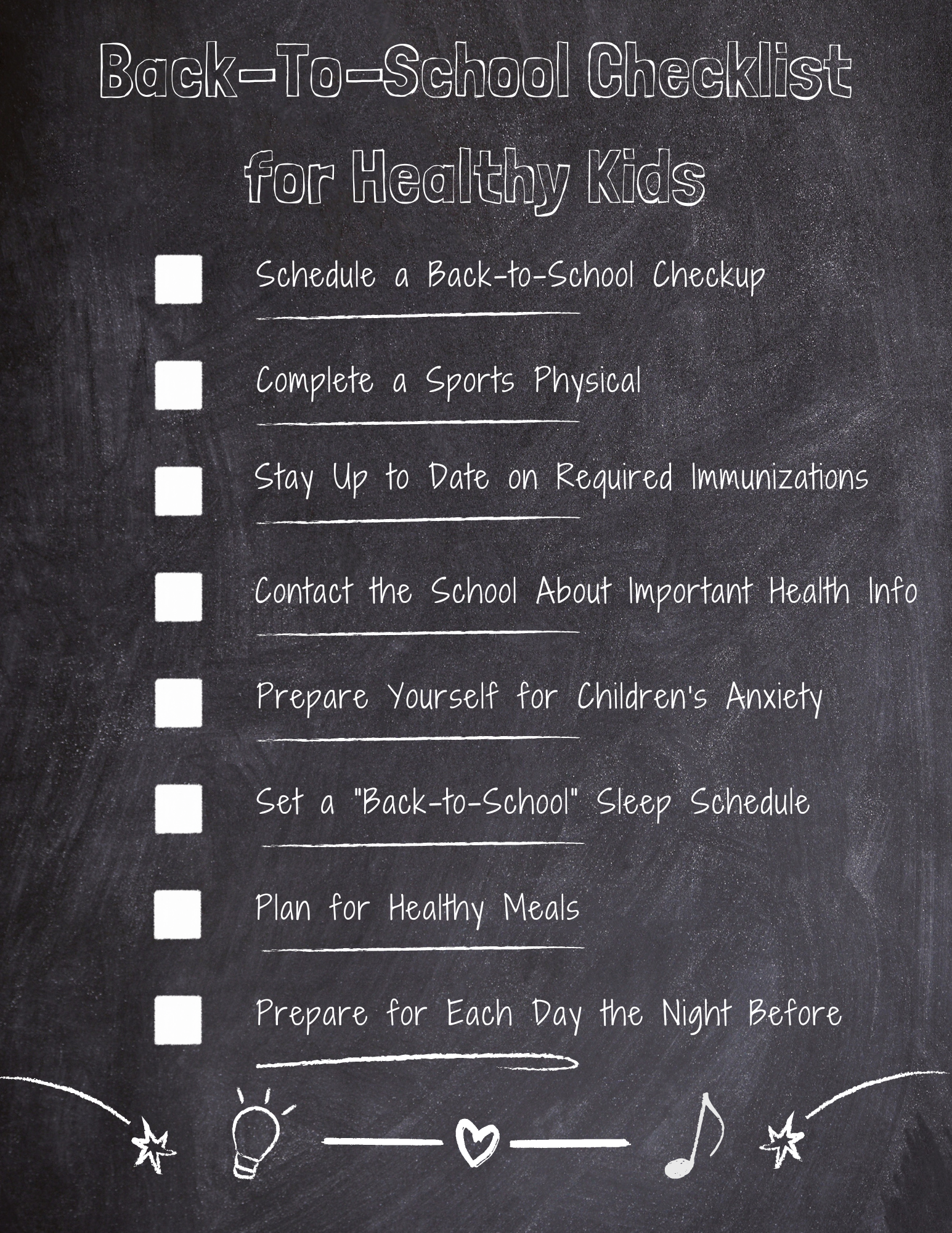Your Back-To-School Checklist for Healthy Kids
July 11, 2023
By: Tallahassee Memorial HealthCare
Categories: Healthy Living
The first day of school is right around the corner, and we know your to-do list is a mile long. While it’s important for children to keep up with summer reading lists and other academic exercises to ensure they return to school prepared, it’s also important to ensure they start the new year as healthy as possible.
Whether your children (or you) are nervous or excited for the first day back – or a little bit of both – our checklist will help you stay organized as you prioritize your children’s health and prepare them to return to the classroom.
Here’s how you can prepare for your child to have the healthiest school year possible:
Schedule a Back-to-School Checkup

A back-to-school checkup, or annual wellness exam, could be a child’s only visit with a doctor each year. During this visit, your child’s pediatrician will conduct a physical exam and discuss diet, exercise and any recommended health screenings. This appointment is crucial for recognizing and addressing physical, developmental or emotional concerns.
The American Academy of Pediatrics’ (AAP) Bright Futures initiative developed a set of guidelines for various screenings and assessments to be conducted at each annual exam, from infancy through adolescence. These guidelines are aimed at tracking development, preventing illness and highlighting potential areas of concern – and they can help you prepare for your child’s annual wellness appointment each year.
It’s important to find a pediatrician you'll stick with when your child is young and maintain consistent annual visits with this doctor throughout your child’s life. This allows the doctor to get to know your child’s unique medical history so they can better track progress, detect problems and make treatment recommendations. Your child’s pediatrician will also maintain all vaccination records, which makes it easier for you when required to show proof of immunizations for school or other activities.
Complete a Sports Physical
The AAP encourages all children to get an annual sports physical, or preparticipation physical evaluation (PPE). Usually, these can be scheduled as part of your child’s back-to-school checkup and help to confirm your child’s safety for participation in various organized sports activities.
A sports physical will go beyond the standard physical examination to further investigate medical history —including family illnesses, chronic conditions, previous injuries, current medications and more. The doctor will also evaluate your child’s posture, joints, strength, flexibility and potential for injuries – as well as engage in a deeper discussion about diet, exercise and the risk of overtraining.
Stay Up to Date on Required Immunizations
Immunizations, or vaccinations, create immunity in the body against diseases, and children are usually required to receive certain vaccinations before they are allowed to attend childcare or school. Among others, these vaccinations typically include:
- Chickenpox
- DTaP (Diphtheria, tetanus and pertussis)
- Hepatitis A + B
- HPV (Human papillomavirus)
- Influenza
- MMR (Measles, mumps, and rubella)
- Polio
- COVID-19
Every year, disease experts review vaccination data and availability to update a schedule of recommended immunizations for children by age. In Florida, the requirements vary by grade level.
Many vaccines are available as combination vaccines (rather than single vaccines) to limit the number of shots administered to children. Severe reactions are rare, and the risk of vaccination complications is much lower than the risk associated with the diseases being prevented. If you have questions about the requirements or administration of vaccines, talk to your child’s pediatrician.
Contact Your Child’s School About Important Health Information
Before school starts, make sure you have completed all paperwork required by your child’s school, such as emergency contact information, health information or school meal forms. Inform your child’s teacher and/or school nurse about any medical issues. This includes food allergies, diabetes, asthma or behavioral health concerns.
It is important to have these conversations with your child’s educators and caregivers ahead of time so that they can be prepared to manage any potential challenges. They might also want to arrange the classroom accordingly if, for example, a child’s vision or hearing impairment might be benefitted by sitting at the front of the room. If any of these issues requires medication during school hours, make arrangements with your child’s teacher or school nurse.
Prepare Yourself for Children’s Anxiety
Comforting a child who is nervous or unhappy about school can be a challenge. Remind your child that everyone feels a little anxious about the first day back to school. Many issues will often resolve as children adjust to new routines. In the meantime, try to emphasize the positive aspects of starting a new school year, such as wearing new clothes, seeing friends, using new school supplies and trying new activities. If your child will be attending a new school, it can be helpful to visit the campus before school starts to help settle any fears of the unknown.
Don’t be afraid to talk through your child’s concerns with them. Are they worried about getting along with a new teacher or making new friends? Are they stressed about doing well on their schoolwork? Are they afraid of being bullied? Sometimes, simply acknowledging and validating their concerns can be enough to settle them. If your child continues to struggle with the everyday routines of school after the first week or two, it may be time to talk to the teacher, a counselor or their pediatrician.
Set a Back-to-School Sleep Schedule
To help alleviate the “back-to-school scaries,” return to a school-night routine several weeks before school starts so that it feels normal by the time school starts. Most importantly, implement a consistent bedtime – usually no later than 9 pm – so that your child can be well-rested and ready to concentrate on learning in the morning.
It might help to create a pre-bedtime routine that could include bathing, reading, prayers or saying goodnight. You should also set a cutoff time for electronic devices including televisions, iPads or phones at least two hours before they go to bed.
Young children need about 10-12 hours of sleep per night, while adolescents should get about 8-10 hours per night. Inadequate sleep can lead to attention and behavioral issues, affecting your child’s ability to excel at school.
Plan for Healthy Meals
Proper nourishment is crucial for children to feel alert, engaged and productive in school. Make sure your child has access to a healthy breakfast and a healthy lunch – whether this is provided at school or prepared at home. Encourage your children to eat a variety of foods – especially fresh fruits and vegetables – to keep them nourished and ready to learn. A well-balanced diet – paired with adequate sleep and good hygiene – will also help to strengthen your child’s immune system so they can better defend themselves against some of those common back-to-school illnesses.
Prepare for Each Day the Night Before
One of the best ways to relieve stress and anxiety on the first day of school (and every day!) is to prepare the previous night. Depending on your child’s age, help or encourage them to prepare clothes, school supplies, a proper backpack and well-balanced meals the night before to avoid feeling rushed in the morning.
Make sure you know when school starts and the logistics of how your child will get there. Do you know exactly where your child needs to be dropped off or where they need to be picked up by the bus? If you child is walking or riding a bicycle, have you mapped out a safe route and discussed traffic safety with them?
Being prepared is important for every school day, but it can be especially helpful for the first day back. We hope this checklist helps you and your child prepare for the first day of school and a great school year.
Here is some additional helpful information for parents from our Healthy Living blog:
- Find a Primary Care Doctor
- Children and Screentime: What’s Appropriate?
- Stretching in Kids: An Overlooked Chronic Problem
- How to Talk to Your Kids about Violence
- Your Child and RSV: Advice from a Pediatrician
- Notice a Change in Your Child’s Behavior? Here’s What You Can Do
- Protect Your Family from Back-to-School Sickness
- Autism: Why Early Intervention is Critical



